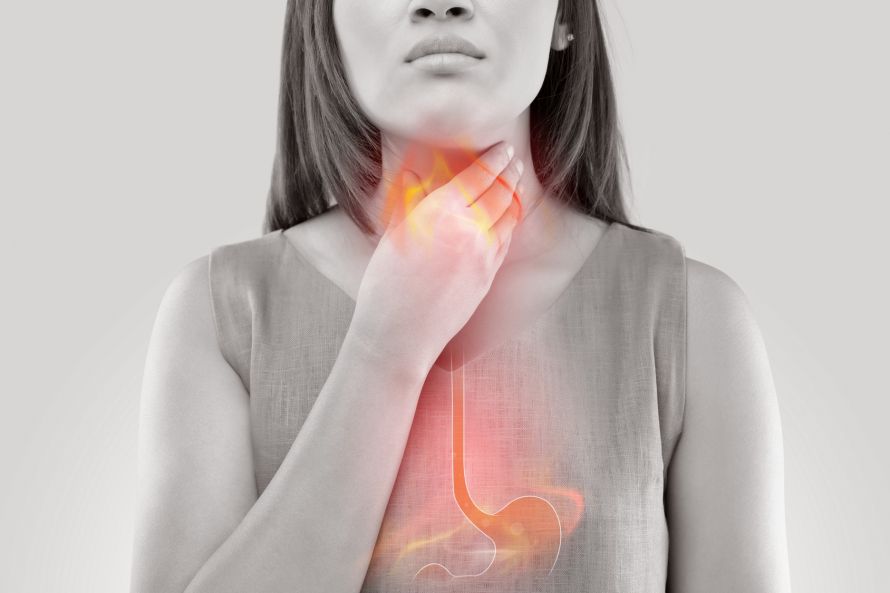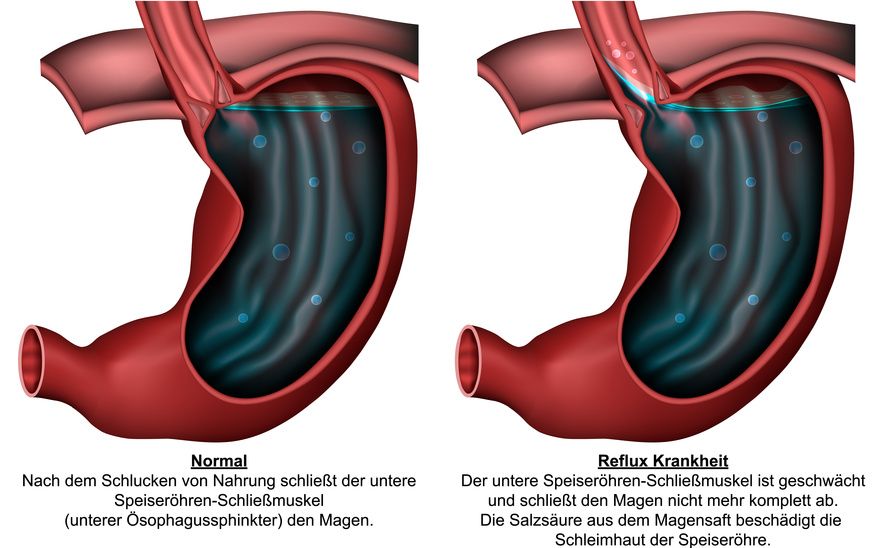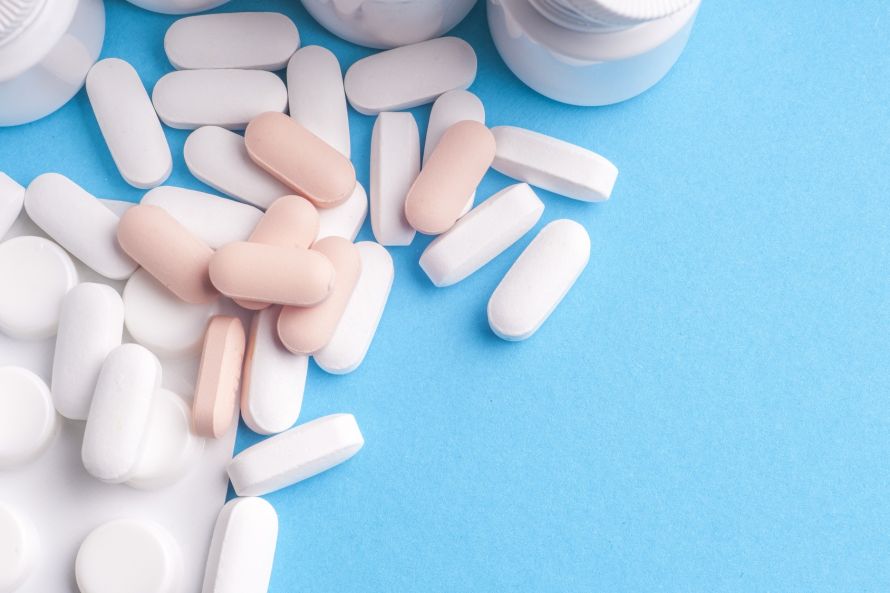It is believed that about a quarter of all people deal with heartburn at least once a month.
The main reasons for heartburn are
- Greasy, rich foods,
- Alcohol,
- Smoking, and
- Larger amounts of caffeinated beverages or sweets.
Heartburn occurs especially when there is pressure in the upper abdomen. This can be the case, for example, if you bend forward or your belt is too tight.

Heartburn causes uncomfortable pain and irritation © Adiano / Fotolia
Risk factors for reflux disease include:
- Being overweight,
- Diabetes mellitus,
- Stress,
- Sitting for long periods in a bent-over position (e.g., at the computer),
- Improper diet,
- Taking certain medications (asthma medications, cardiovascular medications),
- Inflammation of the esophagus,
- Esophageal diverticulum,
- A malignant disease of the stomach or the esophagus, or
- A spasm of the esophageal muscles (esophageal motility disorders, achalasia).
The triggers for heartburn are
- Alcohol,
- Coffee,
- Nicotine,
- Soda,
- Sweets (e.g., gummy bears, chocolate), or
- Larger quantities of citrus fruits.
Some people also react negatively to hot spices, peppermint oil, tomatoes, and fresh bread.
If diet is not the cause of heartburn, other causes may be considered.
In many people, there is a leak at the transition between the esophagus and stomach. This means that the sphincter at the end of the esophagus (esophageal sphincter) is not working properly. This leakage is caused by a hiatal hernia or heart failure. It makes sufferers particularly susceptible to heartburn.
When pressure is applied to the abdomen, the sphincter gives way and the acidic stomach contents leak upward into the esophagus. These symptoms are therefore especially typical during pregnancy.

In reflux disease, the stomach contents can enter the esophagus © bilderzwerg / Fotolia
In most cases, heartburn subsides quickly. In such cases, this is called physiological reflux.
However, if heartburn occurs more than twice a week or does not go away, you may have a reflux disease. Then it is necessary to see a doctor.
Heartburn frequently causes pain that can be localized behind the breastbone. This is accompanied by acid reflux and a pressing feeling of fullness in the upper abdomen.
Irritation of the mucous membranes and rising gastric acid may also cause coughing and hoarseness.
Chronic heartburn or reflux disease can, in severe cases, also damage teeth.
Persistent reflux of gastric acid into the esophagus can lead to esophageal inflammation. In the long run, this can lead to
If heartburn does not disappear on its own or occurs more frequently, a doctor should be consulted. The doctor then examines the patient to find out the cause of the frequent heartburn.
This diagnosis is usually performed by means of a gastroscopy. Additional procedures such as
- pH metrics,
- Pressure measurement of the esophagus (manometry),
- Impedance measurement, or
- A CT scan
are necessary in rare cases. An X-ray is another possible examination method for diagnosing heartburn.
Acute heartburn can often be treated with a little warm milk or possibly also
- A piece of dry bread,
- Rusk, or
- Oatmeal.
Other household remedies are potato juice or caraway oil.
- Still water,
- Yogurt, or
- Cottage cheese
can also alleviate the symptoms.
However, over-the-counter antacids (Maaloxan®, Riopan®) are very commonly used. They act as a buffer against the acid and, depending on the medication, also have a mucosa-protecting effect. The herbal medications Iberogast® and Gaviscon® can also help to improve the symptoms. Sodium bicarbonate in the form of, for example, Bullrich-Salz® or Kaiser Natron® is also still used today.
Reflux disease is usually treated medically with medication. Proton pump inhibitors and, if these are not tolerated, H2 blockers are used. Both medications result in a sustained reduction in acid production by the stomach. With these drugs, heartburn in more than 90% of patients can be satisfactorily controlled.
The medications can be used either as a permanent medication or as an on-demand medication. On-demand medication means that the patient only takes the medication when heartburn is present. After that, the patient stops using it down again.
The medication only takes effect after over 30 minutes. Therefore, on-demand medication is often used in combination with antacids.
Recently, the use of the medication Gavicon® has increased significantly. Gaviscon® is an ingredient derived from brown algae. It swells in contact with gastric acid and thus mechanically closes the transition from the esophagus to the stomach.
This medication is often used in combination with or as an alternative to a proton pump inhibitor. Gaviscon® is available over the counter and is not covered by health insurance.

Heartburn can usually be treated with dietary adjustments and medication © Lyudmyla V / Fotolia
Rarely, when no other means work, surgery may be necessary. This is then called anti-reflux plasty.
If one suffers frequently from heartburn, general measures can lead to an improvement. This includes sleeping with the upper body slightly elevated and avoiding triggering foods and drinks.
In most cases, people tolerate still water better than carbonated water. Prolonged sitting or activity in a bent-over position should be avoided.
It is recommended to eat at least two hours before going to bed. If you are overweight, you should reduce your weight.
The above measures also help with heartburn during pregnancy.
















